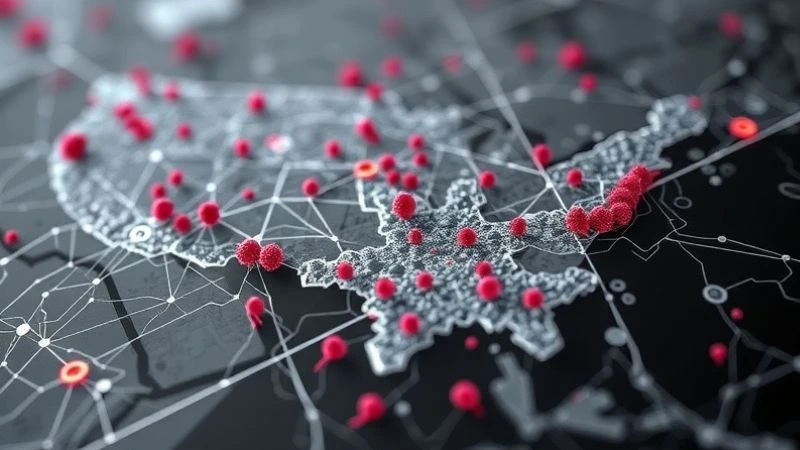
Artificial Intelligence (AI) is revolutionizing many fields, including location tracking. A delectable method involves using the body’s microorganisms, tiny organisms that live on and inside us. These microorganisms, also known as microbiomes, can be unique to individuals and specific environments.
AI can analyze the composition of the microbiome to determine a person’s location with impressive accuracy. This article describes how AI tracks location using the body’s microorganisms and its potential impacts, highlighting the growing role of AI tracking location in a variety of contexts.
What are bodily microorganisms?
 body microorganism
body microorganism
Bodily microorganisms are tiny living organisms, such as bacteria, fungi, and viruses, that live on and in your body. These are often referred to as the microbiome and can be found in your skin, gut, mouth, and other areas. These microorganisms play an important role in maintaining your health by aiding digestion, protecting against harmful bacteria, and supporting your immune system.
However, not all microorganisms are beneficial. Some can cause infections and diseases if they grow uncontrolled or invade parts of the body where they do not belong. A balance of good and bad microorganisms is important to stay healthy. Artificial intelligence helps study the microbiome, identify patterns, and enable personalized treatments based on individual compositions.
How does AI track location using bodily microorganisms?
 AI tracks location
AI tracks location
Scientists have developed an artificial intelligence tool that can track your location by analyzing the microorganisms on your body. These microorganisms, such as bacteria and fungi, act as unique “fingerprints” that vary from place to place. You pick up these microorganisms when you move in different environments, and this AI Track Location can identify where you have been by comparing it to a database of microbial “fingerprints” from different places on your body.
This technology, called Microbiome Geographic Population Structure (MGPS), uses machine learning to match microorganisms with specific geographic regions on your body. It is a powerful tool that can help in areas such as medicine, identifying infection sources, and even solving crimes. Unlike traditional GPS, mGPS uses the human microbiome to track locations, with research rapidly growing similar to the integration of AI patients into medical training.
Benefits of using physiological microorganisms for location tracking
- High accuracy: Microbial “fingerprints” can pinpoint locations with impressive accuracy. This method can identify if someone had visited specific environments such as beaches, train stations or parks.
- Constant updates: Unlike traditional GPS, the human microbiome constantly changes when exposed to different environments, providing real-time updates on location.
- Non-invasive: This method is non-invasive, as it only requires a sample of microorganisms already present on the body.
- Forensic applications: It can provide forensic keys to criminal investigations by linking bacteria to specific geographical origins.
- Medical Insights: Tracing microorganisms can help understand the spread of diseases, identify potential sources of infection, and detect the emergence of microbial resistance.
- Benefits of epidemiology: It can be used in epidemiology to track the movement of people and the spread of infectious diseases.
- Environmental monitoring: This method can help monitor environmental changes by tracking the presence of specific microorganisms in different locations.
Applications of MGPS Technology
There are some potential applications of microbiome geographic population structure (MGPS) technology. here are some of it
- Forensic science: MGPS can help identify a person’s recent locations by analyzing the microorganisms he or she has encountered. It can be useful in criminal investigations to trace the movements of a suspect.
- Epidemiology: By tracking the spread of diseases through analysis of microbial fingerprints, MGPS can provide insight into infection sources and disease transmission patterns.
- Environmental monitoring: MGPS can be used to monitor changes in microbial communities in different environments, helping scientists understand the impact of human activities on ecosystems.
- Personalized medicine: Understanding an individual’s microbiome and its geographic influences can help tailor medical treatments based on their unique microbial profile.
- Public health: MGPS can help track the spread of antibiotic resistance by identifying areas with high levels of resistant microorganisms.
Frequently Asked Questions
Is this method of AI tracking location accurate?
Accuracy can be high, especially with large datasets for AI to learn from, but it may be affected by recent travel or environmental changes.
How long does it take to get location results using this method?
Time can vary depending on the complexity of the analysis and the speed of the AI system, but it usually takes a few hours to a few days.
Can this technology be used to track someone without his knowledge?
Even if technically possible, doing so would raise serious ethical and legal issues. Consent and transparency are necessary.
What type of data to use for AI track location?
AI uses microbiome data from swabs or non-invasive methods, including the types and amounts of microorganisms present.
conclusion
AI track location using the body’s microorganisms is a groundbreaking technology that combines biology and computer science. By analyzing the unique microbial communities on our skin and within our bodies, AI can determine our whereabouts with remarkable accuracy. This innovative approach opens up new possibilities for personalized health care, environmental monitoring and much more.
Despite its potential benefits, this AI track location technology raises significant ethical and privacy concerns that require careful attention. Strong security measures should be developed to protect the privacy of individuals and ensure responsible use. Continued collaboration between scientists, ethicists, and policymakers is critical to advancing AI while preserving individual rights and freedoms.



